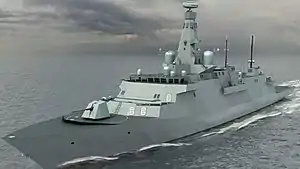HMAS Hunter
HMAS Hunter (FFG) is the lead ship of the Hunter-class frigate of the Royal Australian Navy.
 Type 26 frigate | |
| History | |
|---|---|
| Name | Hunter |
| Namesake | John Hunter |
| Ordered | 30 June 2018 |
| Builder | BAE Systems Australia, Osborne |
| Cost | AU$3.9 billion |
| Laid down | Expected, 2023 |
| Commissioned | Expected, 2031 |
| Identification | Pennant number: |
| Status | Ordered |
| General characteristics | |
| Type | Hunter-class frigate |
| Displacement | 8,800 t (8,700 long tons; 9,700 short tons) full load displacement |
| Length | 149.9 m (492 ft) |
| Beam | 20.8 m (68 ft)[1] |
| Propulsion |
|
| Speed | 27+ knots |
| Range | 7,000 nautical miles (13,000 km; 8,100 mi) in electric motor drive[2] |
| Complement | 180 personnel, with accommodation for 208 |
| Sensors and processing systems |
|
| Electronic warfare & decoys | Nulka decoy launchers |
| Armament |
|
| Aircraft carried |
|
| Aviation facilities | |
| Notes | |
Development and design
The Hunter-class frigate is a future class of frigates for the Royal Australian Navy (RAN) to replace the Anzac-class. Construction is expected to begin in 2020, with the first of nine vessels to enter service in the late 2020s.[6] The Program is expected to cost AU$35 billion and a request for tender was released in March 2017 to three contenders: Navantia, Fincantieri, and BAE Systems as part of a competitive evaluation process.[7]
The Hunter-class frigate will be an Australian variation of the Type 26 class frigate that is to be operated by the Royal Navy from the mid-2020s. The class will have a 8,800-tonne (8,700-long-ton; 9,700-short-ton) full load displacement and will be approximately 150 metres (490 ft) in length. The vessel will be capable of sailing in excess of 27 knots (50 km/h; 31 mph) and will have a full complement of 180 crew.[8][2]
Construction and career
Hunter was ordered on 30 June 2018 and named after Vice Admiral John Hunter. She will be built by BAE Systems Australia in Osborne.[9] First steel was cut on prototype blocks in December 2021. This is to be followed in 2023 with first steel being cut on blocks that will actually be used in ships of the class.[10] The ship is expected to be laid down in 2023 or later and commissioned in 2031.[11]
References
- "Hunter Class FFG". www.navy.gov.au. Royal Australian Navy. Retrieved 5 June 2019.
- "Hunter Class FFG". Royal Australian Navy. n.d. Retrieved 6 July 2018.
- "Joint Media Release - Prime Minister, Minister for Defence and Minister for Defence Industry - New Approach to Naval Combat Systems". Department of Defence. Department of Defence. 3 October 2017. Retrieved 2 October 2017.
- Kerr, Julian (17 May 2017). "Anti-submarine future frigates to be armed with SM-2 missiles to blunt far-distant attacks". The Australian. Retrieved 2017-06-06.
- Kerr, Julian (5 March 2019). "The Type 26 frigate mission bay. Part 2 – configuration and contents". Save the Royal Navy. Retrieved 2018-06-01.
- 2016 Defence White Paper (PDF). p. 93.
- Pyne, Christopher (2017-03-31). "$35 billion Future Frigate Tender". www.minister.defence.gov.au. Retrieved 2017-06-06.
- Wroe, David (28 June 2018). "British frigate program to seed Australia's own warship industry, Turnbull says". Sydney Morning Herald. Retrieved 2018-06-28.
- Kuper, Stephen (2018-06-28). "Here comes the Hunter: BAE awarded $35bn SEA 5000 Future Frigate contract". www.defenceconnect.com.au. Retrieved 2020-12-10.
- https://www.aumanufacturing.com.au/first-hunter-frigate-block-emerges-after-45000-work-hours
- "Australia's Hunter-class frigates are coming, but maybe not soon enough". The Strategist. 2020-11-26. Retrieved 2020-12-10.